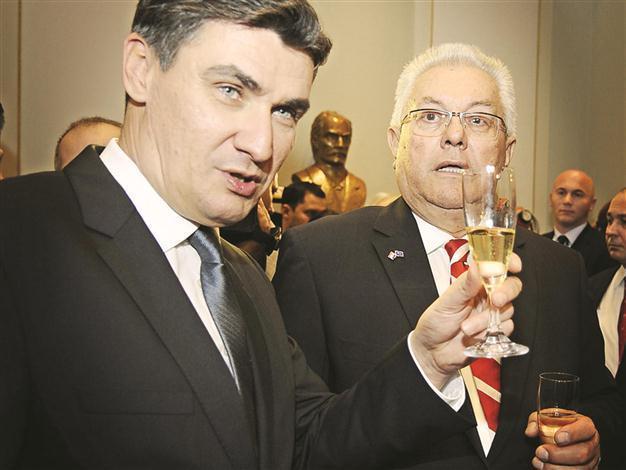Croatia gives lukewarm ‘yes’ to European Union
ZAGREB

Croatian Prime Minister Zoran Milanovic (R) and former Parliamentary President Luka Bebic raise their glasses after hearing the preliminary results of the EU referendum, at the Croatian Parliament building in Zagreb on Jan 22. AFP photo
Croatia will join the European Union next year after 66 percent of voters approved the country’s membership in the bloc in a Jan. 22 referendum that was marked by a poor turnout.With nearly all ballots counted, about 66 percent of those who took part in the referendum answered “yes” to the question “Do you support the membership of the Republic of Croatia in the European Union?” according to Croatia’s state referendum commission. About 33 percent were against, while the rest of the ballots were invalid. However, only about 44 percent of eligible voters took part in the referendum, illustrating voters’ apathy toward the EU. The figures is significantly lower that the 84 percent who voted in a referendum for Croatia’s independence from the former Yugoslavia in 1992.
The figure was also substantially lower than the 54.32 percent turnout for December’s general election, which Prime Minister Zoran Milanovic attributed to general disillusionment with politicians and the country’s economic difficulties.
“The people are obviously tired,” Prime Minister Zoran Milanovic said. “It would have been better that the turnout was larger, but that’s reality.”
It was among the lowest turnouts in any of the EU states that have held accession referendums before they joined. Nearly 46 percent took part in the vote in Hungary, while more than 90 percent voted in Malta.
Despite the low turnout, Croatia is now set to become the EU’s 28th member and the second from the former Yugoslavia following Slovenia, which joined in 2004.
Praise from EU
“This is a message due to the situation in the country, a message to my government,” said Milanovic, whose center-left coalition led by his Social Democrats (SDP) ousted the scandal-plagued conservative HDZ.
Nevertheless, he welcomed the result. “It is a historic decision ... possibly a turning point in our history,” he said.
President Ivo Josipovic also welcomed the decision but warned that the authorities should also take into account fears and dilemmas of those who voted “no.”
For their part, the EU congratulated Croatians on their vote, saying it was good news for the whole Balkan region. “The upcoming accession of Croatia sends a clear signal to the whole region of southeastern Europe,” it said in a statement. “It shows that through political courage and determined reforms, EU membership is within reach.”
In a joint statement from Brussels, EU president Herman van Rompuy and EU Commission chief Jose Manuel Barroso welcomed the referendum result, saying “Croatia’s citizens have given their endorsement to European integration.”
Opponents said Croatia had nothing to gain by entering the bloc, which is fighting off the bankruptcy of some of its members. They said Croatia would lose its sovereignty and the national identity it fought for in a war for independence from Yugoslavia in the 1990s. Croatia’s EU accession treaty must still be ratified by all 27 members of the bloc before the country formally joins. Slovenia is the only current EU member among the six former Yugoslav republics, though Serbia, Montenegro, Macedonia and Bosnia and Herzegovina all have aspirations to join.
Compiled from AP and AFP stories by the Daily News staff.
















